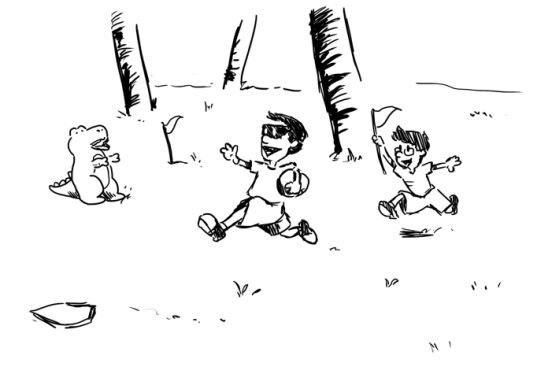By Paul Esau (The Cascade) – Email
Print Edition: November 21, 2012
I’m a rules guy in sports. I admit it. In middle school, when Caleb “Achilles” Toews only counted to four steamboats before crushing George “Pipsqueak” Klassen, it bothered me, and not just because it meant I had to root around for George’s scattered teeth (again). Rules create the means through which athletes can directly compare excellence. Rules create order, order creates “sport” from mere “war,” and “sport” is a God-given North American pastime.
Still, there are moments when even I grow tired of the strictly regulated, multiple-refereed, instant-replayed sporting events which have come to dominate our culture, and yearn for something more spontaneous. Where is the ingenuity in our sports? Where is the chance to match not only skill against skill, but also intellect against intellect? If sports are indeed a thinly-veiled, socially-acceptable replacement for battle, then why are they so strictly formalized into quaint little games?
I’ve only come across one sport in all my years of athletics which creates adequate flexibility for the breadth and flux of true competition, and it’s one I’ve never been brave enough to try. In fact, I’m only sure of a single rule, one golden rule in contrast to the manuals which accompany most other sports. And that rule is simple: you may not play the game the same way twice.
Yup folks, I’m talking about Calvinball.
Named after the wisest six-year-old I have ever known, Calvinball is the brainchild of cartoonist Bill Watterson, and has been widely popularized in Calvin & Hobbes. Like life itself, it combines triumph and tragedy, passion and pain, sorrow and song, and occasionally bandit masks and wickets. Also like life, Calvinball is a competition which encompasses every facet of human accomplishment into a single fluctuating battle of skill and wits.
Played by two or more individuals who begin in a vacuum of possibility, the game accrues complexity with each stroke, swing or play. The rules are created by the players themselves, and often marked by specific “zones” in which specific rules apply. Some zones have sub-zones with corollary rules, others are affected by specific objects such as the “opposite pole” or “slow-motion flag,” while others involve the composition of poetry or songs for successful navigation. Scorekeeping in Calvinball is also governed by a general lack of coherence (“Q to 12” being a famous example), which subverts the traditional expectation that scores document the relative progress of two sides in competition.
The game can be played with wickets, balls, flags, boxes, mints, shuttlecocks, water balloons, sacks, buckets, coins or any other object which any player decides to incorporate. The actual gameplay is frantic and interspersed with the spontaneous creation of new rules or zones to improve gameplay or counteract previous rules. Masks are (almost) mandatory, and symbolize the mischief at the heart of the sport, the mischief which has been largely lost from more conventional athletics.
Actually, the game can be played pretty much anywhere with pretty much anything.
In short, Calvinball stands in defiance of our culture’s obsession with rules and regulations, our need to make each sport a science understood only by the professionals. Frankly, I suspect the only reason we care so much about rules is because we have, culturally, such an obsession with winning. In order to achieve victory one has to quantify the expectations necessary for victory, and therefore one must have lots, more, too many rules. Admittedly, Calvinball is a hard sport to win, but that’s because it’s not a sport you play to win.
It’s a sport you play simply for the joy of playing.
Yes, I am a rules guy. But I’m also a guy who understands that, in order to clearly define victor from loser, we have narrowed the definition of our sports down to such a specific expression that we’ve had to cultivate an army of specialists just to play them. Our sports don’t reflect the frantic, varied nature of our lives. They don’t reflect who we are, or the creativity which is so inherent to the human condition.
So next time you and a couple friends are sitting at a restaurant table with some spare change waiting for your food to come, or lounging in the airport with a hacky sack and two packs of breath-mints, or even playing a conventional sport that you hate (like baseball), exercise some of that common human ingenuity and create a little Calvinball.
Think of it as a rebellion against the system, a sporting version of Occupy Wall Street. Or simply think of it as a way to have fun. And thank Calvin for teaching you that fun is more important than rules, and that a properly composed “pernicious poem” is just as devastating as a touchdown punt return.
“Other kids’ games are all such a bore!
They’ve gotta have rules and they gotta keep score!
Calvinball is better by far!
It’s never the same! It’s always bizarre!
You don’t need a team or a referee!
You know that it’s great, ‘cause it’s named after me!”
~Calvin (from Calvin & Hobbes)


